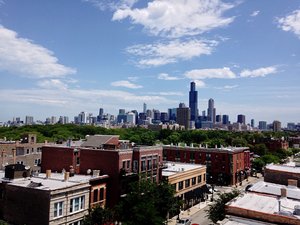Rendel Solomon grew up in West Garfield Park, attended the Latin School in Lincoln Park, studied engineering at Tulane University and eventually received an MBA from Columbia University in New York. He worked at Procter & Gamble and as an entrepreneur in the music industry.
Despite his continued accolades and credentials, he racked up enough student loan and credit card debt to land him back on his sister's couch in Chicago nine years ago.
"The really unfortunate part is that here I am getting all this private school education, but education in school doesn’t teach you to about how to manage your money," he said.
He realized that in order to turn kids like him--a first generation college student who grew up in a tough neighborhood--into wealth generators for their family and community, it would take more than getting students into top tier schools and jobs.
That's why Solomon, who's now a principal at Muller & Monroe Asset Management, launched One Stock One Future, a nonprofit that teaches high schools students financial literacy through stock ownership.
Since launching One Stock One Future this summer, he's raised $20,000 for the venture through crowdfunding, private investments and the Acting UP award from The Chicago Community Trust and Goodcity Chicago, and has made 60 students at three Chicago high schools in to shareholders of Apple, Nike and Disney. His ultimate goal is to turn one million underprivileged students into shareholders, to create a sense of financial ownership and responsibility.
"If all of us feel like we belong and all of us feel like owners I think that’s how you move forward and improve communities for the long term," he said.
The idea came from his own journey back from financial difficulty. When he landed back in Chicago, he admitted he was at a low point and realized he needed to learn the financial lessons that he missed along the way. Over the next three years he learned to budget, paid back his debt, got his interest rates under control, built back his credit score, and started working in private equity.
He decided to give his 8-year-old niece Kaydence stocks in Nike, Apple and Disney. On a lunch break last spring, he walked her down Michigan Avenue to the Disney store to see if he could help her understand this gift. He explained that she owned part of the store, and she responded. “Do I make money when people buy stuff?”
"I said, 'You kind of do, let’s talk about how that works,'" Solomon recalled. "It was the tangible experience she had, related to finance. I had found a way to take a subject that is typically never taught, especially at that age and make it connect to her by showing her the products and companies she could own."
Solomon started teaching students about financial literacy and investments through the Chicago Urban League, but was only able to work with three to four students at a time. He realized that in order to scale his solution, he'd have to start his own venture.
So far, he's worked with students at LINK Unlimited Scholars, University of Chicago Collegiate Scholars and Innovations High School. Each class is different, he said, but he asks students to vote as a class about what stocks they want to buy and why they chose one company over another. Students have discussed how Samsung's exploding phones might impact Apple's stock, and the strength of the Nike brand over other athletic apparel, he said. Once they decide, he gives each student $20 of their desired stock through Stockpile (they sign up with their parents), and offers them the opportunity to put their own money into the account if they want.
He plans to do follow up classes to talk about financial literacy and diversification of investments in the future, as well as develop online curriculum so students have a resource if they want to continue studying the topic.
Though it's a small amount ($20 would be about half a share of Nike's current stock), he hopes that by teaching students about stocks, he can slip in a sense of financial ownership that will translate to savings and investment down the line.
"When they go down the street and they see Nike when they own Nike stock, when they see iPhones when they own Apple stock, when they see Starbucks— they can go, 'I own a piece of what’s out here. It’s not just for those other people,'" he said.








